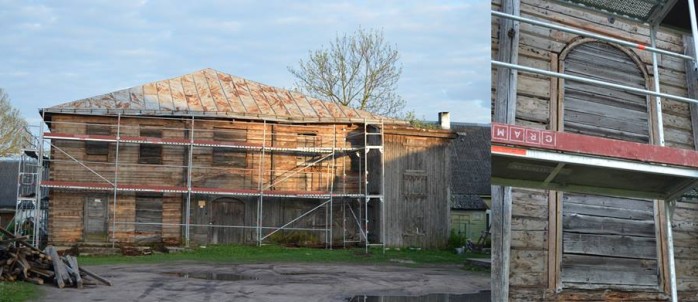
A ceremony was held at the unique wooden synagogue in Žiežmariai, Lithuania on May 19, 2016, to mark a new stage in its life: its resurrection. The ceremony marked the beginning of work by the Kaišiadorys Regional Administration and Lithuania’s Cultural Heritage Department to restore the house of worship and featured a concert by the Rakija Klezmer Orkestar and works of Paganini by violinist Gediminas Dalinkevičius.
An allocation of 85,000 euros from the Ministry of Culture to the Kaišiadorys Regional Administration and an additional 24,840 euros from the regional administration are to be used initially to fix the roof and repair the façade, stabilize the building and perform archaeological work. A total of 693,000 euros is needed for reconstruction of the synagogue and additional sources of funding are being sought.
“The Lithuanian Jewish Community agrees to turn the synagogue over for public use because the Jewish community of Žiežmariai no longer exists and the synagogue won’t be used as a house of prayer. The synagogue can be utilized very well for the cultural needs of the region and at the same time remain a place of commemoration for the Jewish community of the area,” LJC chairwoman Faina Kukliansky said.
The Kaišiadorys regional administration approved drafting the agreement to transfer the synagogue and use it for the public’s needs at the administration council meeting on July 30, 2015. The terms of the agreement are for a 99-year lease. This will insure the unique wooden synagogue survives as a building and will also provide benefits as a multiple public use venue for educational and cultural functions, for tourism and for other public activities. The wooden synagogue has been listed on the registry of cultural treasures. It is one of only 14 wooden synagogues still standing in Lithuania.
Kukliansky believes it could help the local economy by drawing in tourists and it is included on a European Jewish cultural itinerary. Even in its current state it does attract a lot of attention from Jewish tourists travelling between Vilnius and Kaunas. She said the Lithuanian Jewish Community will also contribute to the extent of its ability to its external and internal restoration.
Kaišiadorys regional administration head Vytenis Tomkus agreed and said after restoration the synagogue could attract more tourists, but that it was important it be respected as a symbol of the great contributions made by the once large Jewish community to the architecture and life of the region. He said a working group has been in operation for some time which is deciding how best to make use of the building after reconstruction.

